Leadership and Management Report for Grosvenor Hotel in London
VerifiedAdded on 2023/01/11
|12
|3565
|29
Report
AI Summary
This report provides a comprehensive analysis of leadership and management practices within Grosvenor Hotel London, a prominent service industry organization. The report begins by introducing the core concepts of leadership and management, emphasizing their critical roles in achieving organizational goals, particularly within the service sector. It then delves into classical management theories, including administrative (Fayol), behavioral, scientific, and bureaucratic theories, evaluating their applicability and effectiveness within the hotel setting. The report also examines the roles of leaders and various leadership styles, such as democratic, autocratic, and participative, comparing and contrasting management and leadership styles. Furthermore, it assesses the current management and leadership styles employed at Grosvenor Hotel, including transformational, democratic, and participative approaches. Talent management is explored as a contemporary leadership and management model, emphasizing its importance in retaining top talent. The report also considers internal and external factors that influence talent management strategies, such as resource availability and technological advancements. Finally, the report examines changes in management styles and the application of hard and soft skills within the context of Grosvenor Hotel's operations.
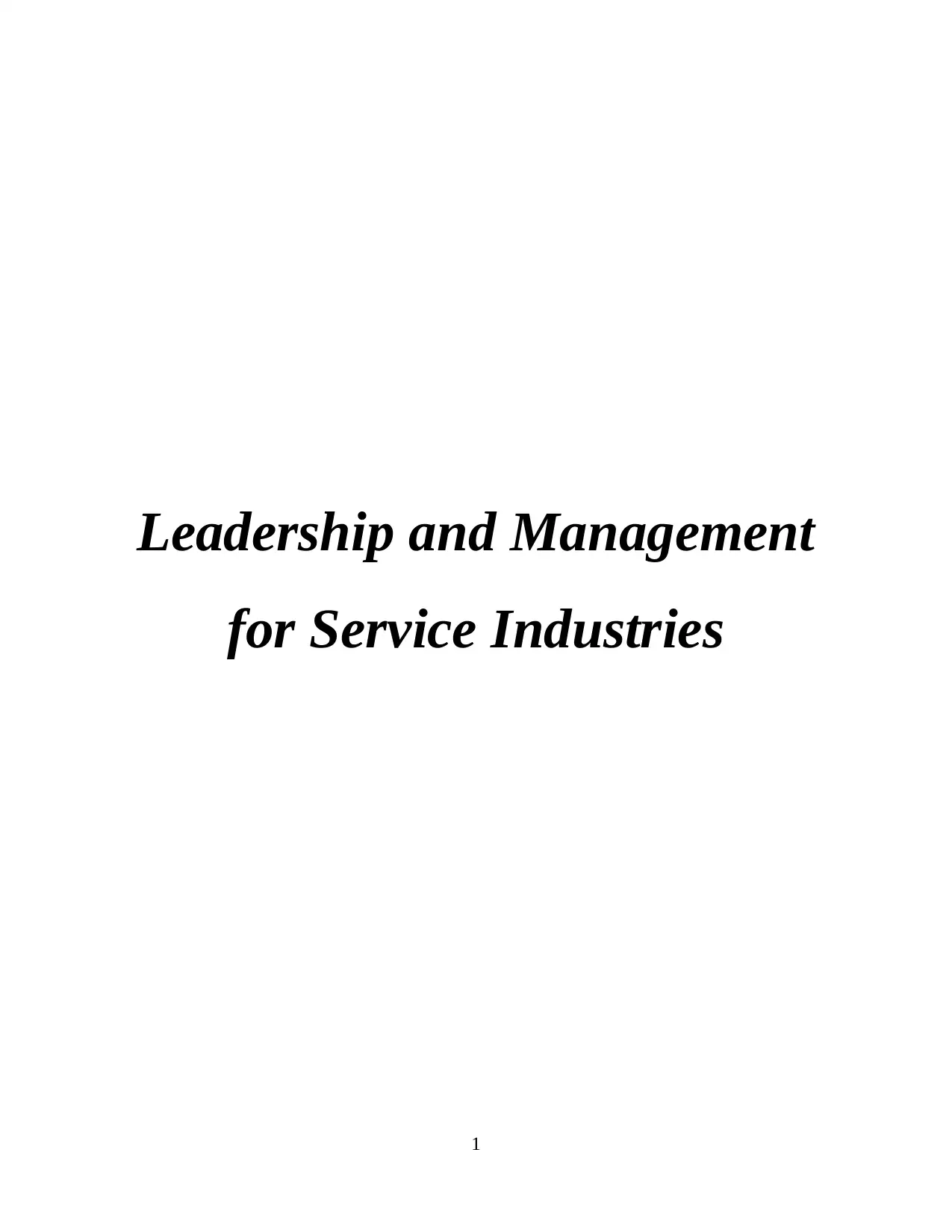
Leadership and Management
for Service Industries
1
for Service Industries
1
Paraphrase This Document
Need a fresh take? Get an instant paraphrase of this document with our AI Paraphraser
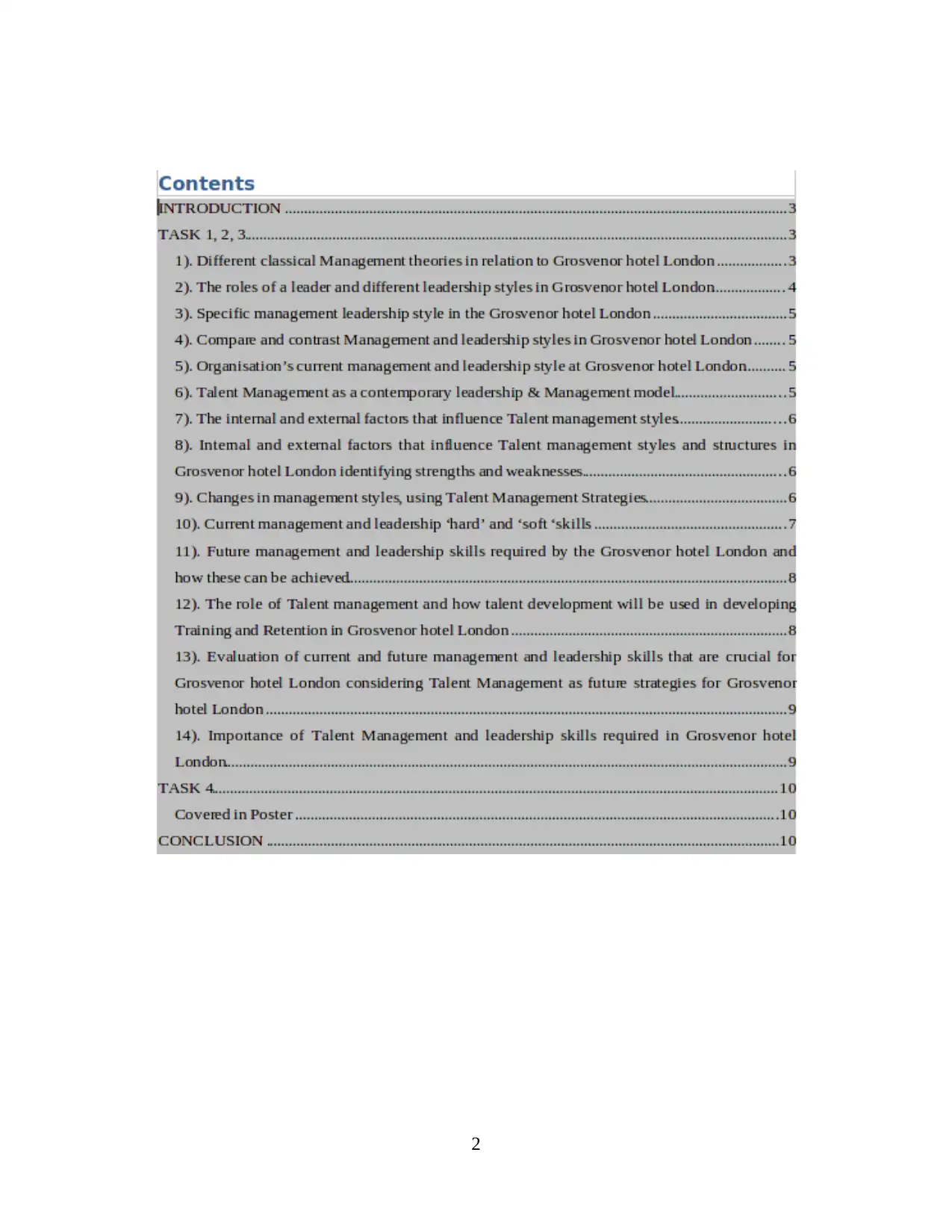
2
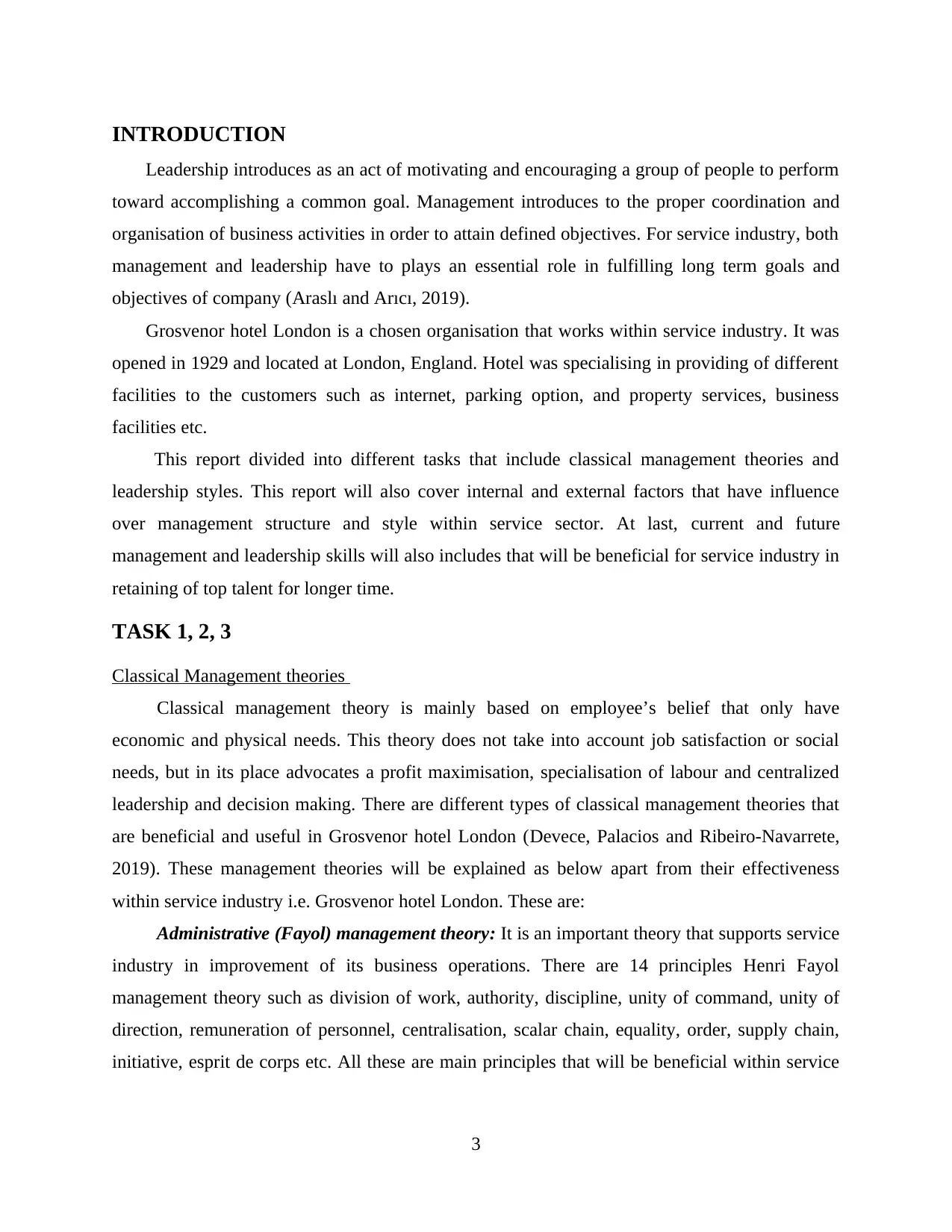
INTRODUCTION
Leadership introduces as an act of motivating and encouraging a group of people to perform
toward accomplishing a common goal. Management introduces to the proper coordination and
organisation of business activities in order to attain defined objectives. For service industry, both
management and leadership have to plays an essential role in fulfilling long term goals and
objectives of company (Araslı and Arıcı, 2019).
Grosvenor hotel London is a chosen organisation that works within service industry. It was
opened in 1929 and located at London, England. Hotel was specialising in providing of different
facilities to the customers such as internet, parking option, and property services, business
facilities etc.
This report divided into different tasks that include classical management theories and
leadership styles. This report will also cover internal and external factors that have influence
over management structure and style within service sector. At last, current and future
management and leadership skills will also includes that will be beneficial for service industry in
retaining of top talent for longer time.
TASK 1, 2, 3
Classical Management theories
Classical management theory is mainly based on employee’s belief that only have
economic and physical needs. This theory does not take into account job satisfaction or social
needs, but in its place advocates a profit maximisation, specialisation of labour and centralized
leadership and decision making. There are different types of classical management theories that
are beneficial and useful in Grosvenor hotel London (Devece, Palacios and Ribeiro-Navarrete,
2019). These management theories will be explained as below apart from their effectiveness
within service industry i.e. Grosvenor hotel London. These are:
Administrative (Fayol) management theory: It is an important theory that supports service
industry in improvement of its business operations. There are 14 principles Henri Fayol
management theory such as division of work, authority, discipline, unity of command, unity of
direction, remuneration of personnel, centralisation, scalar chain, equality, order, supply chain,
initiative, esprit de corps etc. All these are main principles that will be beneficial within service
3
Leadership introduces as an act of motivating and encouraging a group of people to perform
toward accomplishing a common goal. Management introduces to the proper coordination and
organisation of business activities in order to attain defined objectives. For service industry, both
management and leadership have to plays an essential role in fulfilling long term goals and
objectives of company (Araslı and Arıcı, 2019).
Grosvenor hotel London is a chosen organisation that works within service industry. It was
opened in 1929 and located at London, England. Hotel was specialising in providing of different
facilities to the customers such as internet, parking option, and property services, business
facilities etc.
This report divided into different tasks that include classical management theories and
leadership styles. This report will also cover internal and external factors that have influence
over management structure and style within service sector. At last, current and future
management and leadership skills will also includes that will be beneficial for service industry in
retaining of top talent for longer time.
TASK 1, 2, 3
Classical Management theories
Classical management theory is mainly based on employee’s belief that only have
economic and physical needs. This theory does not take into account job satisfaction or social
needs, but in its place advocates a profit maximisation, specialisation of labour and centralized
leadership and decision making. There are different types of classical management theories that
are beneficial and useful in Grosvenor hotel London (Devece, Palacios and Ribeiro-Navarrete,
2019). These management theories will be explained as below apart from their effectiveness
within service industry i.e. Grosvenor hotel London. These are:
Administrative (Fayol) management theory: It is an important theory that supports service
industry in improvement of its business operations. There are 14 principles Henri Fayol
management theory such as division of work, authority, discipline, unity of command, unity of
direction, remuneration of personnel, centralisation, scalar chain, equality, order, supply chain,
initiative, esprit de corps etc. All these are main principles that will be beneficial within service
3
⊘ This is a preview!⊘
Do you want full access?
Subscribe today to unlock all pages.

Trusted by 1+ million students worldwide
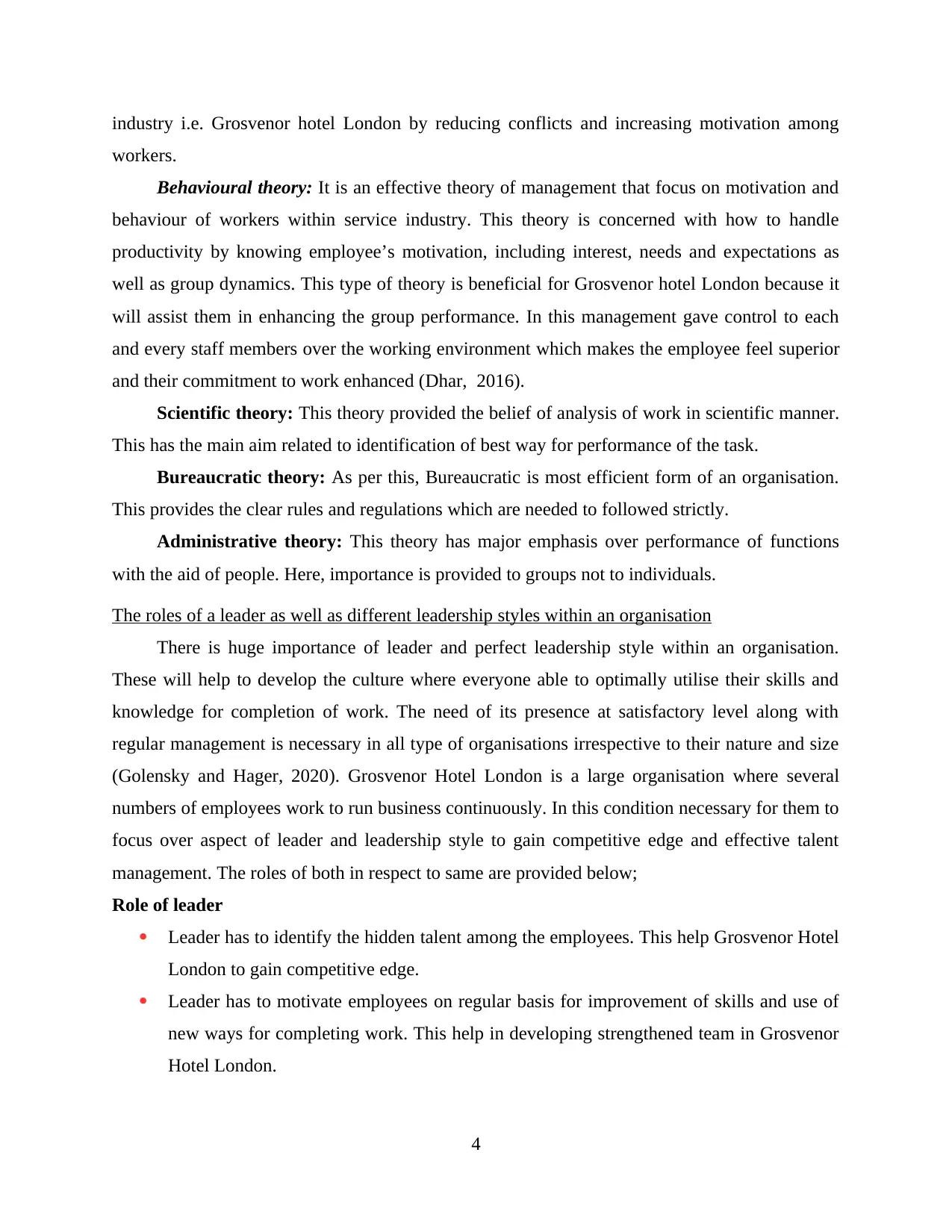
industry i.e. Grosvenor hotel London by reducing conflicts and increasing motivation among
workers.
Behavioural theory: It is an effective theory of management that focus on motivation and
behaviour of workers within service industry. This theory is concerned with how to handle
productivity by knowing employee’s motivation, including interest, needs and expectations as
well as group dynamics. This type of theory is beneficial for Grosvenor hotel London because it
will assist them in enhancing the group performance. In this management gave control to each
and every staff members over the working environment which makes the employee feel superior
and their commitment to work enhanced (Dhar, 2016).
Scientific theory: This theory provided the belief of analysis of work in scientific manner.
This has the main aim related to identification of best way for performance of the task.
Bureaucratic theory: As per this, Bureaucratic is most efficient form of an organisation.
This provides the clear rules and regulations which are needed to followed strictly.
Administrative theory: This theory has major emphasis over performance of functions
with the aid of people. Here, importance is provided to groups not to individuals.
The roles of a leader as well as different leadership styles within an organisation
There is huge importance of leader and perfect leadership style within an organisation.
These will help to develop the culture where everyone able to optimally utilise their skills and
knowledge for completion of work. The need of its presence at satisfactory level along with
regular management is necessary in all type of organisations irrespective to their nature and size
(Golensky and Hager, 2020). Grosvenor Hotel London is a large organisation where several
numbers of employees work to run business continuously. In this condition necessary for them to
focus over aspect of leader and leadership style to gain competitive edge and effective talent
management. The roles of both in respect to same are provided below;
Role of leader
Leader has to identify the hidden talent among the employees. This help Grosvenor Hotel
London to gain competitive edge.
Leader has to motivate employees on regular basis for improvement of skills and use of
new ways for completing work. This help in developing strengthened team in Grosvenor
Hotel London.
4
workers.
Behavioural theory: It is an effective theory of management that focus on motivation and
behaviour of workers within service industry. This theory is concerned with how to handle
productivity by knowing employee’s motivation, including interest, needs and expectations as
well as group dynamics. This type of theory is beneficial for Grosvenor hotel London because it
will assist them in enhancing the group performance. In this management gave control to each
and every staff members over the working environment which makes the employee feel superior
and their commitment to work enhanced (Dhar, 2016).
Scientific theory: This theory provided the belief of analysis of work in scientific manner.
This has the main aim related to identification of best way for performance of the task.
Bureaucratic theory: As per this, Bureaucratic is most efficient form of an organisation.
This provides the clear rules and regulations which are needed to followed strictly.
Administrative theory: This theory has major emphasis over performance of functions
with the aid of people. Here, importance is provided to groups not to individuals.
The roles of a leader as well as different leadership styles within an organisation
There is huge importance of leader and perfect leadership style within an organisation.
These will help to develop the culture where everyone able to optimally utilise their skills and
knowledge for completion of work. The need of its presence at satisfactory level along with
regular management is necessary in all type of organisations irrespective to their nature and size
(Golensky and Hager, 2020). Grosvenor Hotel London is a large organisation where several
numbers of employees work to run business continuously. In this condition necessary for them to
focus over aspect of leader and leadership style to gain competitive edge and effective talent
management. The roles of both in respect to same are provided below;
Role of leader
Leader has to identify the hidden talent among the employees. This help Grosvenor Hotel
London to gain competitive edge.
Leader has to motivate employees on regular basis for improvement of skills and use of
new ways for completing work. This help in developing strengthened team in Grosvenor
Hotel London.
4
Paraphrase This Document
Need a fresh take? Get an instant paraphrase of this document with our AI Paraphraser
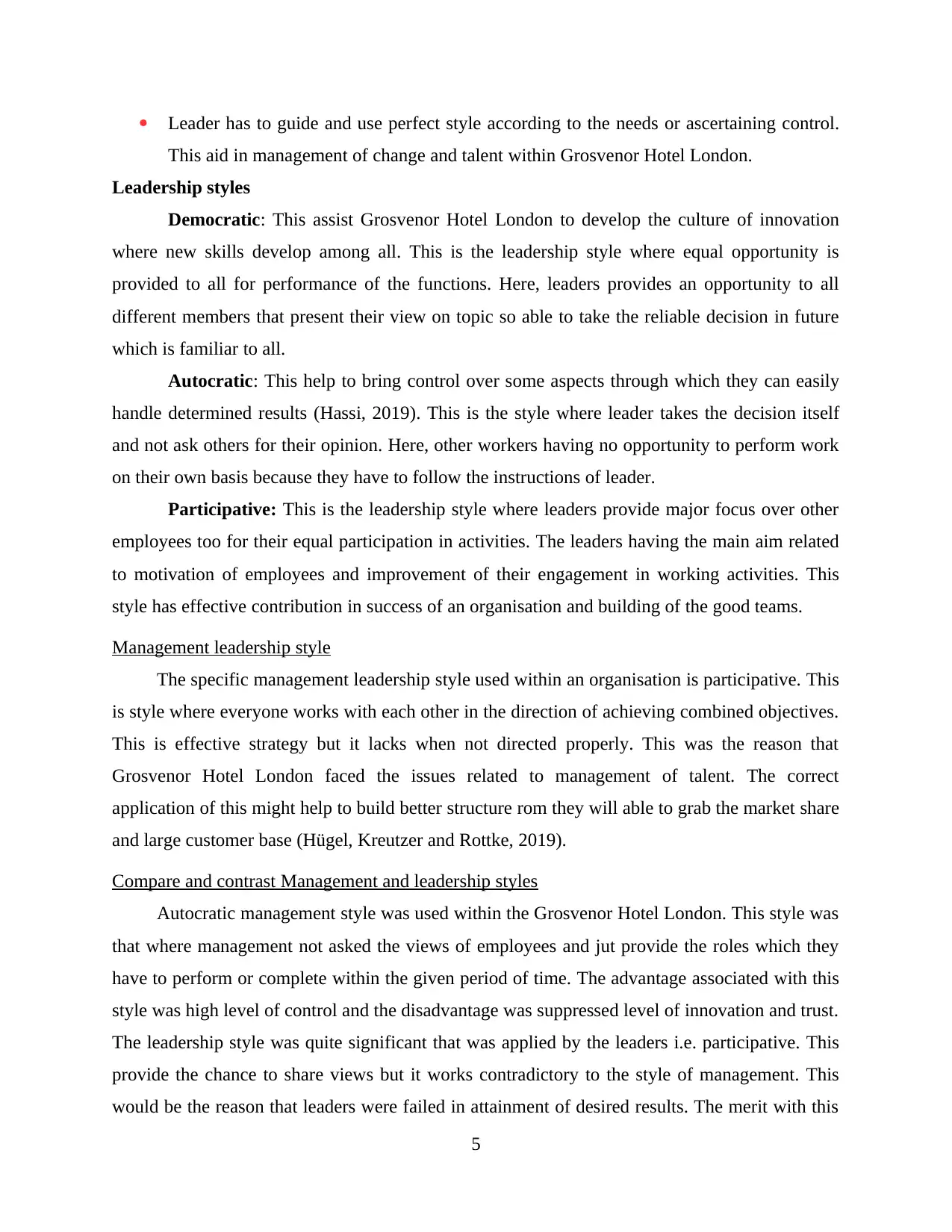
Leader has to guide and use perfect style according to the needs or ascertaining control.
This aid in management of change and talent within Grosvenor Hotel London.
Leadership styles
Democratic: This assist Grosvenor Hotel London to develop the culture of innovation
where new skills develop among all. This is the leadership style where equal opportunity is
provided to all for performance of the functions. Here, leaders provides an opportunity to all
different members that present their view on topic so able to take the reliable decision in future
which is familiar to all.
Autocratic: This help to bring control over some aspects through which they can easily
handle determined results (Hassi, 2019). This is the style where leader takes the decision itself
and not ask others for their opinion. Here, other workers having no opportunity to perform work
on their own basis because they have to follow the instructions of leader.
Participative: This is the leadership style where leaders provide major focus over other
employees too for their equal participation in activities. The leaders having the main aim related
to motivation of employees and improvement of their engagement in working activities. This
style has effective contribution in success of an organisation and building of the good teams.
Management leadership style
The specific management leadership style used within an organisation is participative. This
is style where everyone works with each other in the direction of achieving combined objectives.
This is effective strategy but it lacks when not directed properly. This was the reason that
Grosvenor Hotel London faced the issues related to management of talent. The correct
application of this might help to build better structure rom they will able to grab the market share
and large customer base (Hügel, Kreutzer and Rottke, 2019).
Compare and contrast Management and leadership styles
Autocratic management style was used within the Grosvenor Hotel London. This style was
that where management not asked the views of employees and jut provide the roles which they
have to perform or complete within the given period of time. The advantage associated with this
style was high level of control and the disadvantage was suppressed level of innovation and trust.
The leadership style was quite significant that was applied by the leaders i.e. participative. This
provide the chance to share views but it works contradictory to the style of management. This
would be the reason that leaders were failed in attainment of desired results. The merit with this
5
This aid in management of change and talent within Grosvenor Hotel London.
Leadership styles
Democratic: This assist Grosvenor Hotel London to develop the culture of innovation
where new skills develop among all. This is the leadership style where equal opportunity is
provided to all for performance of the functions. Here, leaders provides an opportunity to all
different members that present their view on topic so able to take the reliable decision in future
which is familiar to all.
Autocratic: This help to bring control over some aspects through which they can easily
handle determined results (Hassi, 2019). This is the style where leader takes the decision itself
and not ask others for their opinion. Here, other workers having no opportunity to perform work
on their own basis because they have to follow the instructions of leader.
Participative: This is the leadership style where leaders provide major focus over other
employees too for their equal participation in activities. The leaders having the main aim related
to motivation of employees and improvement of their engagement in working activities. This
style has effective contribution in success of an organisation and building of the good teams.
Management leadership style
The specific management leadership style used within an organisation is participative. This
is style where everyone works with each other in the direction of achieving combined objectives.
This is effective strategy but it lacks when not directed properly. This was the reason that
Grosvenor Hotel London faced the issues related to management of talent. The correct
application of this might help to build better structure rom they will able to grab the market share
and large customer base (Hügel, Kreutzer and Rottke, 2019).
Compare and contrast Management and leadership styles
Autocratic management style was used within the Grosvenor Hotel London. This style was
that where management not asked the views of employees and jut provide the roles which they
have to perform or complete within the given period of time. The advantage associated with this
style was high level of control and the disadvantage was suppressed level of innovation and trust.
The leadership style was quite significant that was applied by the leaders i.e. participative. This
provide the chance to share views but it works contradictory to the style of management. This
would be the reason that leaders were failed in attainment of desired results. The merit with this
5
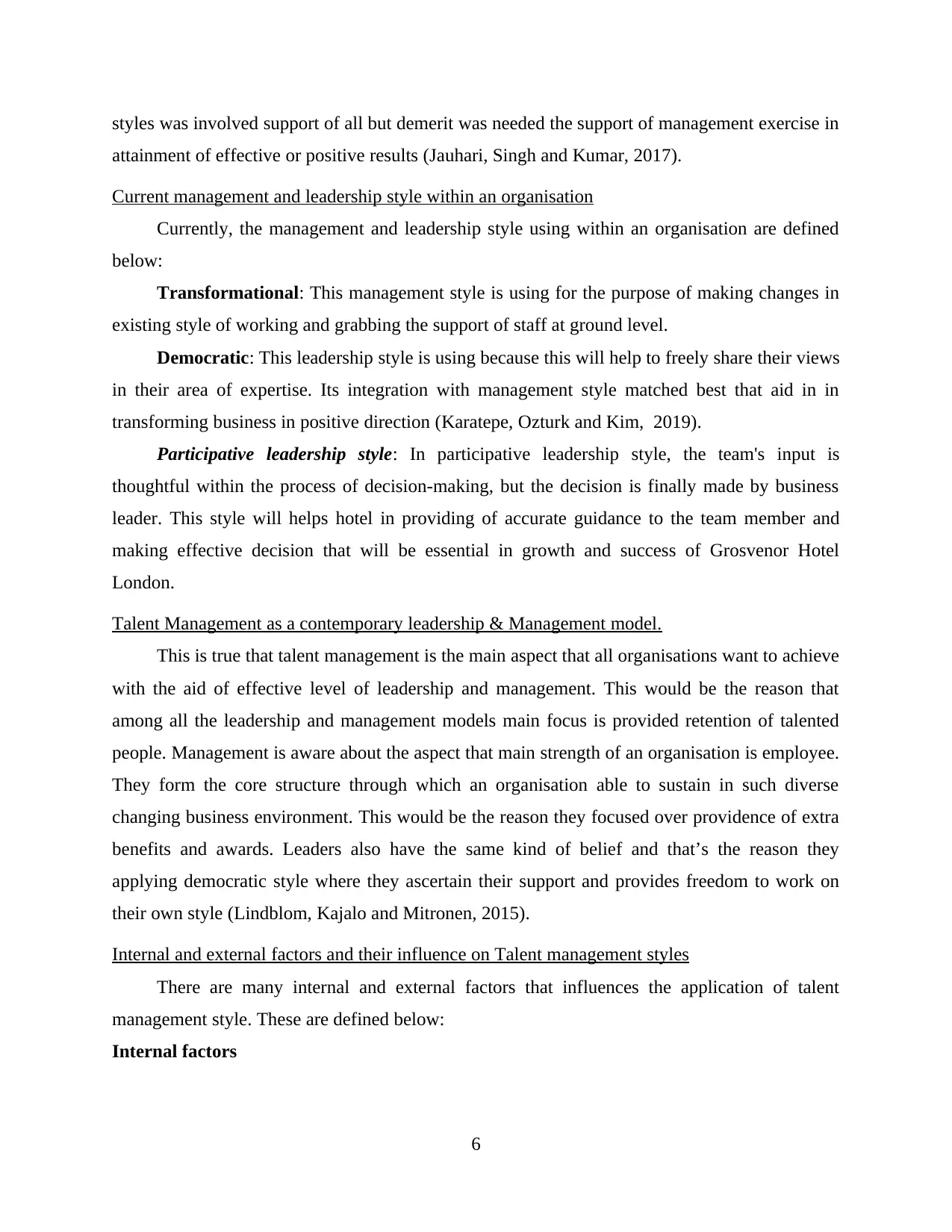
styles was involved support of all but demerit was needed the support of management exercise in
attainment of effective or positive results (Jauhari, Singh and Kumar, 2017).
Current management and leadership style within an organisation
Currently, the management and leadership style using within an organisation are defined
below:
Transformational: This management style is using for the purpose of making changes in
existing style of working and grabbing the support of staff at ground level.
Democratic: This leadership style is using because this will help to freely share their views
in their area of expertise. Its integration with management style matched best that aid in in
transforming business in positive direction (Karatepe, Ozturk and Kim, 2019).
Participative leadership style: In participative leadership style, the team's input is
thoughtful within the process of decision-making, but the decision is finally made by business
leader. This style will helps hotel in providing of accurate guidance to the team member and
making effective decision that will be essential in growth and success of Grosvenor Hotel
London.
Talent Management as a contemporary leadership & Management model.
This is true that talent management is the main aspect that all organisations want to achieve
with the aid of effective level of leadership and management. This would be the reason that
among all the leadership and management models main focus is provided retention of talented
people. Management is aware about the aspect that main strength of an organisation is employee.
They form the core structure through which an organisation able to sustain in such diverse
changing business environment. This would be the reason they focused over providence of extra
benefits and awards. Leaders also have the same kind of belief and that’s the reason they
applying democratic style where they ascertain their support and provides freedom to work on
their own style (Lindblom, Kajalo and Mitronen, 2015).
Internal and external factors and their influence on Talent management styles
There are many internal and external factors that influences the application of talent
management style. These are defined below:
Internal factors
6
attainment of effective or positive results (Jauhari, Singh and Kumar, 2017).
Current management and leadership style within an organisation
Currently, the management and leadership style using within an organisation are defined
below:
Transformational: This management style is using for the purpose of making changes in
existing style of working and grabbing the support of staff at ground level.
Democratic: This leadership style is using because this will help to freely share their views
in their area of expertise. Its integration with management style matched best that aid in in
transforming business in positive direction (Karatepe, Ozturk and Kim, 2019).
Participative leadership style: In participative leadership style, the team's input is
thoughtful within the process of decision-making, but the decision is finally made by business
leader. This style will helps hotel in providing of accurate guidance to the team member and
making effective decision that will be essential in growth and success of Grosvenor Hotel
London.
Talent Management as a contemporary leadership & Management model.
This is true that talent management is the main aspect that all organisations want to achieve
with the aid of effective level of leadership and management. This would be the reason that
among all the leadership and management models main focus is provided retention of talented
people. Management is aware about the aspect that main strength of an organisation is employee.
They form the core structure through which an organisation able to sustain in such diverse
changing business environment. This would be the reason they focused over providence of extra
benefits and awards. Leaders also have the same kind of belief and that’s the reason they
applying democratic style where they ascertain their support and provides freedom to work on
their own style (Lindblom, Kajalo and Mitronen, 2015).
Internal and external factors and their influence on Talent management styles
There are many internal and external factors that influences the application of talent
management style. These are defined below:
Internal factors
6
⊘ This is a preview!⊘
Do you want full access?
Subscribe today to unlock all pages.

Trusted by 1+ million students worldwide
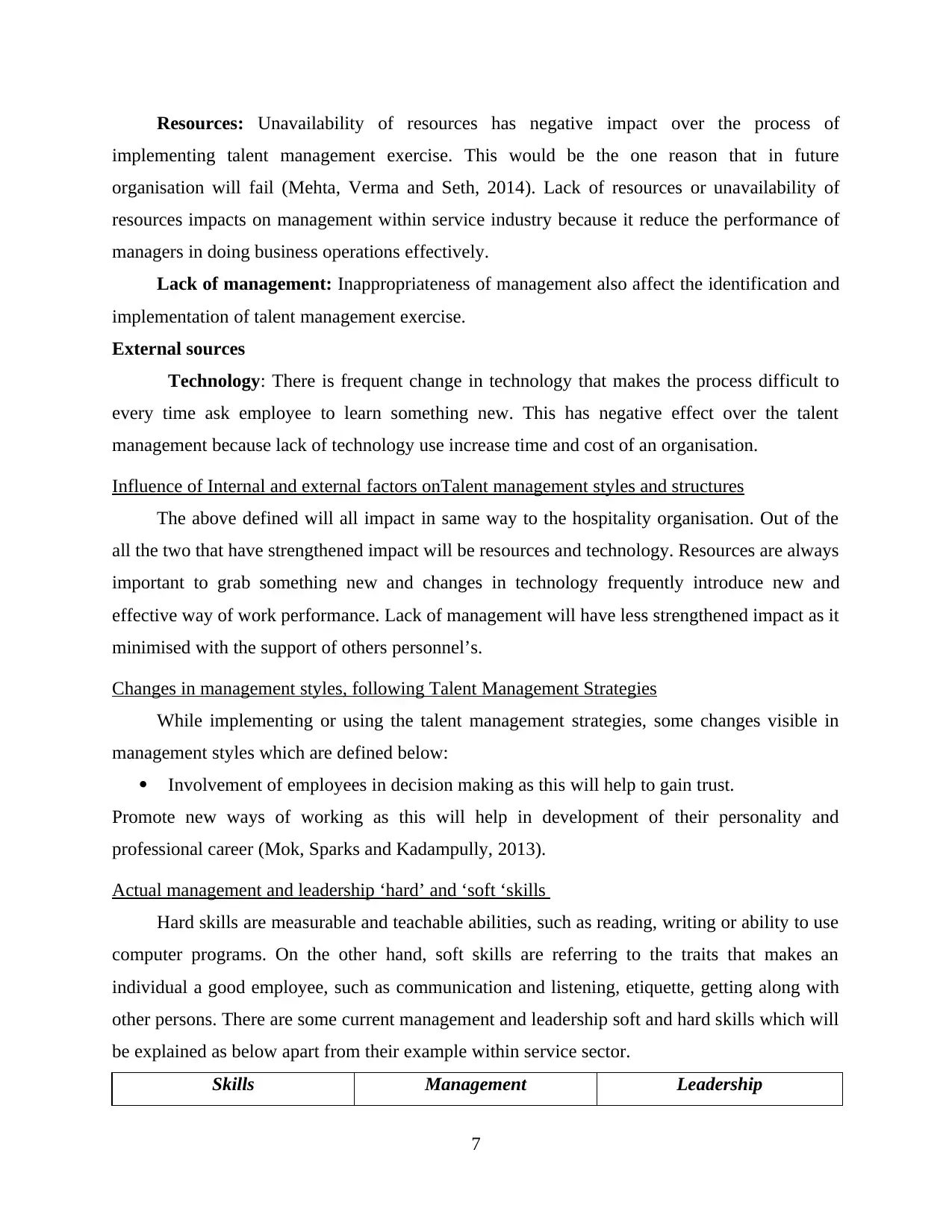
Resources: Unavailability of resources has negative impact over the process of
implementing talent management exercise. This would be the one reason that in future
organisation will fail (Mehta, Verma and Seth, 2014). Lack of resources or unavailability of
resources impacts on management within service industry because it reduce the performance of
managers in doing business operations effectively.
Lack of management: Inappropriateness of management also affect the identification and
implementation of talent management exercise.
External sources
Technology: There is frequent change in technology that makes the process difficult to
every time ask employee to learn something new. This has negative effect over the talent
management because lack of technology use increase time and cost of an organisation.
Influence of Internal and external factors onTalent management styles and structures
The above defined will all impact in same way to the hospitality organisation. Out of the
all the two that have strengthened impact will be resources and technology. Resources are always
important to grab something new and changes in technology frequently introduce new and
effective way of work performance. Lack of management will have less strengthened impact as it
minimised with the support of others personnel’s.
Changes in management styles, following Talent Management Strategies
While implementing or using the talent management strategies, some changes visible in
management styles which are defined below:
Involvement of employees in decision making as this will help to gain trust.
Promote new ways of working as this will help in development of their personality and
professional career (Mok, Sparks and Kadampully, 2013).
Actual management and leadership ‘hard’ and ‘soft ‘skills
Hard skills are measurable and teachable abilities, such as reading, writing or ability to use
computer programs. On the other hand, soft skills are referring to the traits that makes an
individual a good employee, such as communication and listening, etiquette, getting along with
other persons. There are some current management and leadership soft and hard skills which will
be explained as below apart from their example within service sector.
Skills Management Leadership
7
implementing talent management exercise. This would be the one reason that in future
organisation will fail (Mehta, Verma and Seth, 2014). Lack of resources or unavailability of
resources impacts on management within service industry because it reduce the performance of
managers in doing business operations effectively.
Lack of management: Inappropriateness of management also affect the identification and
implementation of talent management exercise.
External sources
Technology: There is frequent change in technology that makes the process difficult to
every time ask employee to learn something new. This has negative effect over the talent
management because lack of technology use increase time and cost of an organisation.
Influence of Internal and external factors onTalent management styles and structures
The above defined will all impact in same way to the hospitality organisation. Out of the
all the two that have strengthened impact will be resources and technology. Resources are always
important to grab something new and changes in technology frequently introduce new and
effective way of work performance. Lack of management will have less strengthened impact as it
minimised with the support of others personnel’s.
Changes in management styles, following Talent Management Strategies
While implementing or using the talent management strategies, some changes visible in
management styles which are defined below:
Involvement of employees in decision making as this will help to gain trust.
Promote new ways of working as this will help in development of their personality and
professional career (Mok, Sparks and Kadampully, 2013).
Actual management and leadership ‘hard’ and ‘soft ‘skills
Hard skills are measurable and teachable abilities, such as reading, writing or ability to use
computer programs. On the other hand, soft skills are referring to the traits that makes an
individual a good employee, such as communication and listening, etiquette, getting along with
other persons. There are some current management and leadership soft and hard skills which will
be explained as below apart from their example within service sector.
Skills Management Leadership
7
Paraphrase This Document
Need a fresh take? Get an instant paraphrase of this document with our AI Paraphraser
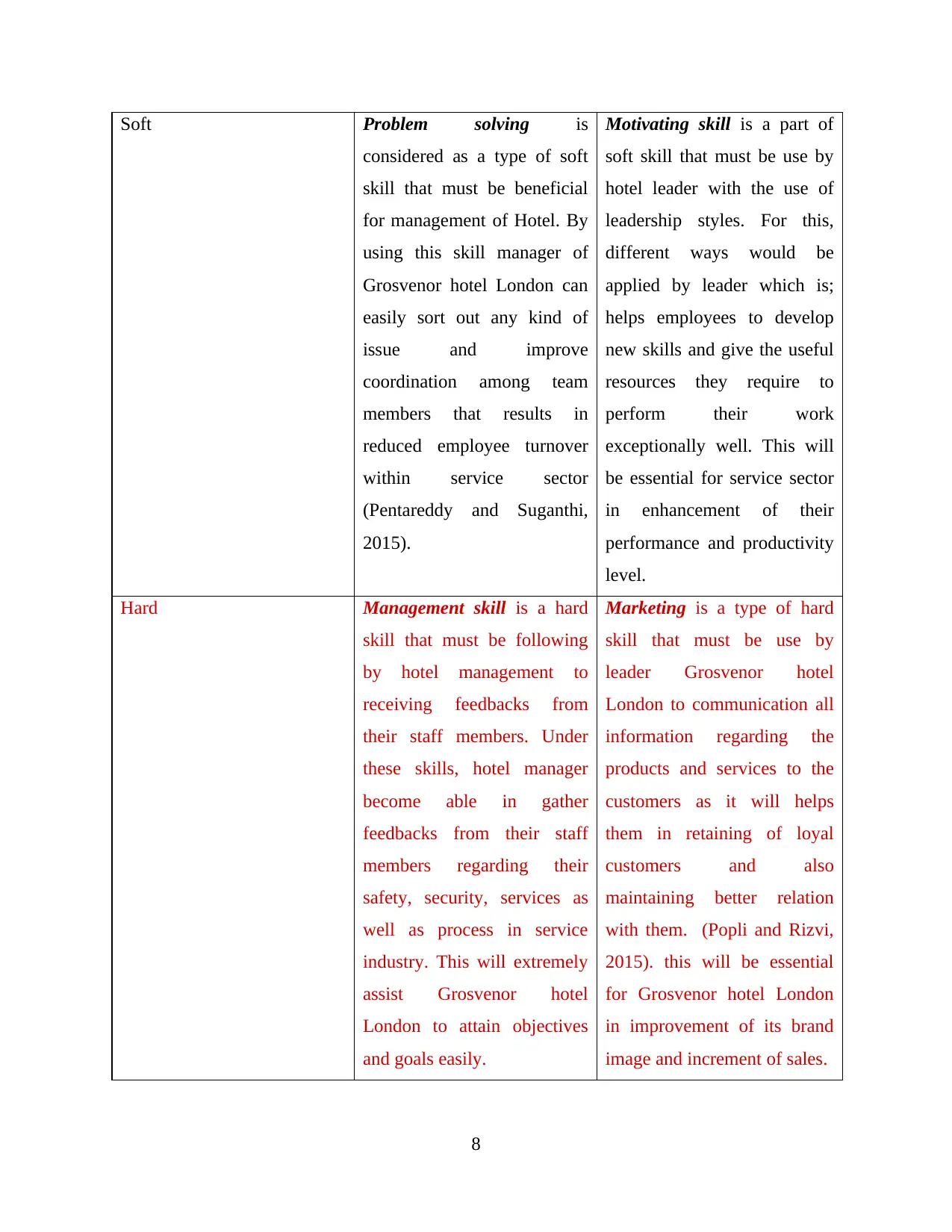
Soft Problem solving is
considered as a type of soft
skill that must be beneficial
for management of Hotel. By
using this skill manager of
Grosvenor hotel London can
easily sort out any kind of
issue and improve
coordination among team
members that results in
reduced employee turnover
within service sector
(Pentareddy and Suganthi,
2015).
Motivating skill is a part of
soft skill that must be use by
hotel leader with the use of
leadership styles. For this,
different ways would be
applied by leader which is;
helps employees to develop
new skills and give the useful
resources they require to
perform their work
exceptionally well. This will
be essential for service sector
in enhancement of their
performance and productivity
level.
Hard Management skill is a hard
skill that must be following
by hotel management to
receiving feedbacks from
their staff members. Under
these skills, hotel manager
become able in gather
feedbacks from their staff
members regarding their
safety, security, services as
well as process in service
industry. This will extremely
assist Grosvenor hotel
London to attain objectives
and goals easily.
Marketing is a type of hard
skill that must be use by
leader Grosvenor hotel
London to communication all
information regarding the
products and services to the
customers as it will helps
them in retaining of loyal
customers and also
maintaining better relation
with them. (Popli and Rizvi,
2015). this will be essential
for Grosvenor hotel London
in improvement of its brand
image and increment of sales.
8
considered as a type of soft
skill that must be beneficial
for management of Hotel. By
using this skill manager of
Grosvenor hotel London can
easily sort out any kind of
issue and improve
coordination among team
members that results in
reduced employee turnover
within service sector
(Pentareddy and Suganthi,
2015).
Motivating skill is a part of
soft skill that must be use by
hotel leader with the use of
leadership styles. For this,
different ways would be
applied by leader which is;
helps employees to develop
new skills and give the useful
resources they require to
perform their work
exceptionally well. This will
be essential for service sector
in enhancement of their
performance and productivity
level.
Hard Management skill is a hard
skill that must be following
by hotel management to
receiving feedbacks from
their staff members. Under
these skills, hotel manager
become able in gather
feedbacks from their staff
members regarding their
safety, security, services as
well as process in service
industry. This will extremely
assist Grosvenor hotel
London to attain objectives
and goals easily.
Marketing is a type of hard
skill that must be use by
leader Grosvenor hotel
London to communication all
information regarding the
products and services to the
customers as it will helps
them in retaining of loyal
customers and also
maintaining better relation
with them. (Popli and Rizvi,
2015). this will be essential
for Grosvenor hotel London
in improvement of its brand
image and increment of sales.
8
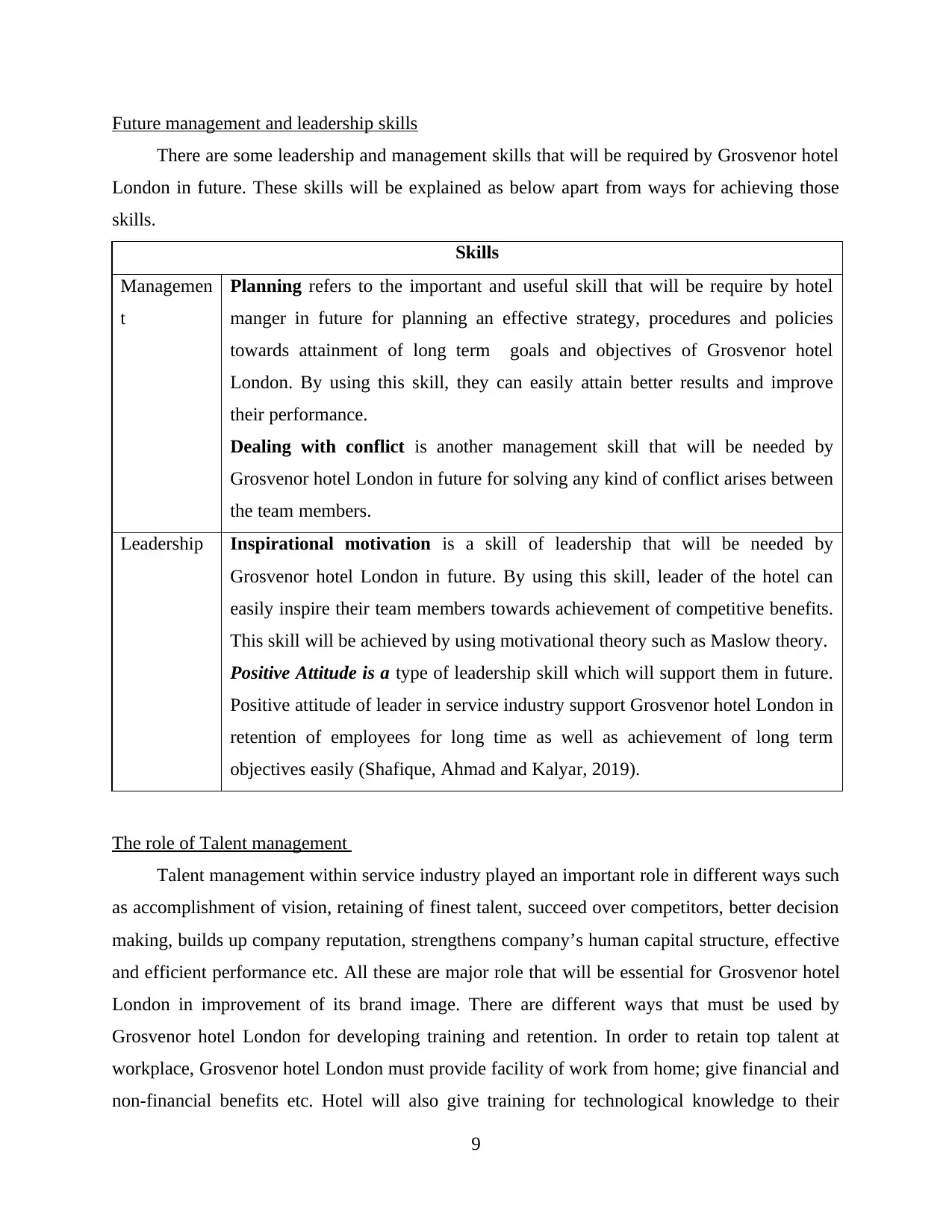
Future management and leadership skills
There are some leadership and management skills that will be required by Grosvenor hotel
London in future. These skills will be explained as below apart from ways for achieving those
skills.
Skills
Managemen
t
Planning refers to the important and useful skill that will be require by hotel
manger in future for planning an effective strategy, procedures and policies
towards attainment of long term goals and objectives of Grosvenor hotel
London. By using this skill, they can easily attain better results and improve
their performance.
Dealing with conflict is another management skill that will be needed by
Grosvenor hotel London in future for solving any kind of conflict arises between
the team members.
Leadership Inspirational motivation is a skill of leadership that will be needed by
Grosvenor hotel London in future. By using this skill, leader of the hotel can
easily inspire their team members towards achievement of competitive benefits.
This skill will be achieved by using motivational theory such as Maslow theory.
Positive Attitude is a type of leadership skill which will support them in future.
Positive attitude of leader in service industry support Grosvenor hotel London in
retention of employees for long time as well as achievement of long term
objectives easily (Shafique, Ahmad and Kalyar, 2019).
The role of Talent management
Talent management within service industry played an important role in different ways such
as accomplishment of vision, retaining of finest talent, succeed over competitors, better decision
making, builds up company reputation, strengthens company’s human capital structure, effective
and efficient performance etc. All these are major role that will be essential for Grosvenor hotel
London in improvement of its brand image. There are different ways that must be used by
Grosvenor hotel London for developing training and retention. In order to retain top talent at
workplace, Grosvenor hotel London must provide facility of work from home; give financial and
non-financial benefits etc. Hotel will also give training for technological knowledge to their
9
There are some leadership and management skills that will be required by Grosvenor hotel
London in future. These skills will be explained as below apart from ways for achieving those
skills.
Skills
Managemen
t
Planning refers to the important and useful skill that will be require by hotel
manger in future for planning an effective strategy, procedures and policies
towards attainment of long term goals and objectives of Grosvenor hotel
London. By using this skill, they can easily attain better results and improve
their performance.
Dealing with conflict is another management skill that will be needed by
Grosvenor hotel London in future for solving any kind of conflict arises between
the team members.
Leadership Inspirational motivation is a skill of leadership that will be needed by
Grosvenor hotel London in future. By using this skill, leader of the hotel can
easily inspire their team members towards achievement of competitive benefits.
This skill will be achieved by using motivational theory such as Maslow theory.
Positive Attitude is a type of leadership skill which will support them in future.
Positive attitude of leader in service industry support Grosvenor hotel London in
retention of employees for long time as well as achievement of long term
objectives easily (Shafique, Ahmad and Kalyar, 2019).
The role of Talent management
Talent management within service industry played an important role in different ways such
as accomplishment of vision, retaining of finest talent, succeed over competitors, better decision
making, builds up company reputation, strengthens company’s human capital structure, effective
and efficient performance etc. All these are major role that will be essential for Grosvenor hotel
London in improvement of its brand image. There are different ways that must be used by
Grosvenor hotel London for developing training and retention. In order to retain top talent at
workplace, Grosvenor hotel London must provide facility of work from home; give financial and
non-financial benefits etc. Hotel will also give training for technological knowledge to their
9
⊘ This is a preview!⊘
Do you want full access?
Subscribe today to unlock all pages.

Trusted by 1+ million students worldwide
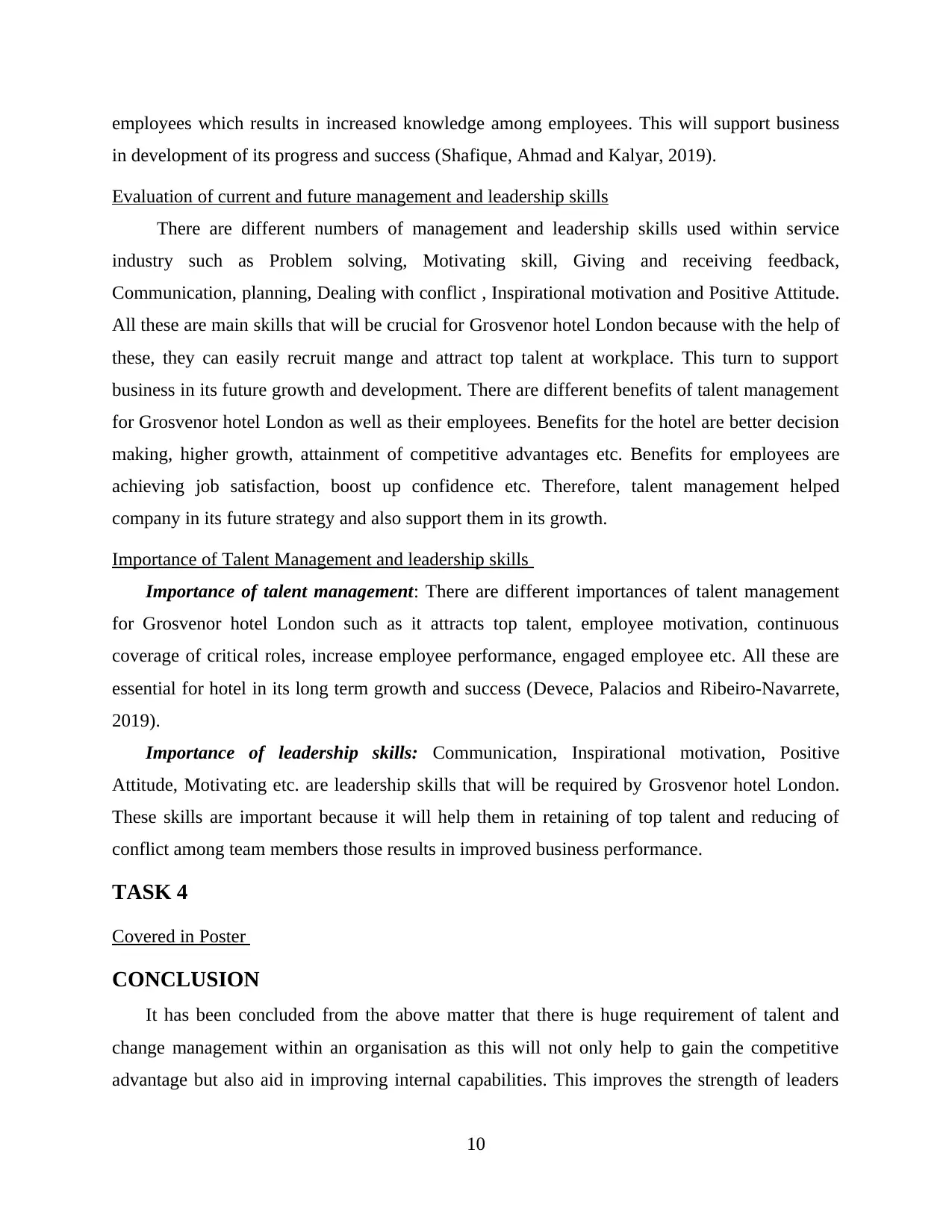
employees which results in increased knowledge among employees. This will support business
in development of its progress and success (Shafique, Ahmad and Kalyar, 2019).
Evaluation of current and future management and leadership skills
There are different numbers of management and leadership skills used within service
industry such as Problem solving, Motivating skill, Giving and receiving feedback,
Communication, planning, Dealing with conflict , Inspirational motivation and Positive Attitude.
All these are main skills that will be crucial for Grosvenor hotel London because with the help of
these, they can easily recruit mange and attract top talent at workplace. This turn to support
business in its future growth and development. There are different benefits of talent management
for Grosvenor hotel London as well as their employees. Benefits for the hotel are better decision
making, higher growth, attainment of competitive advantages etc. Benefits for employees are
achieving job satisfaction, boost up confidence etc. Therefore, talent management helped
company in its future strategy and also support them in its growth.
Importance of Talent Management and leadership skills
Importance of talent management: There are different importances of talent management
for Grosvenor hotel London such as it attracts top talent, employee motivation, continuous
coverage of critical roles, increase employee performance, engaged employee etc. All these are
essential for hotel in its long term growth and success (Devece, Palacios and Ribeiro-Navarrete,
2019).
Importance of leadership skills: Communication, Inspirational motivation, Positive
Attitude, Motivating etc. are leadership skills that will be required by Grosvenor hotel London.
These skills are important because it will help them in retaining of top talent and reducing of
conflict among team members those results in improved business performance.
TASK 4
Covered in Poster
CONCLUSION
It has been concluded from the above matter that there is huge requirement of talent and
change management within an organisation as this will not only help to gain the competitive
advantage but also aid in improving internal capabilities. This improves the strength of leaders
10
in development of its progress and success (Shafique, Ahmad and Kalyar, 2019).
Evaluation of current and future management and leadership skills
There are different numbers of management and leadership skills used within service
industry such as Problem solving, Motivating skill, Giving and receiving feedback,
Communication, planning, Dealing with conflict , Inspirational motivation and Positive Attitude.
All these are main skills that will be crucial for Grosvenor hotel London because with the help of
these, they can easily recruit mange and attract top talent at workplace. This turn to support
business in its future growth and development. There are different benefits of talent management
for Grosvenor hotel London as well as their employees. Benefits for the hotel are better decision
making, higher growth, attainment of competitive advantages etc. Benefits for employees are
achieving job satisfaction, boost up confidence etc. Therefore, talent management helped
company in its future strategy and also support them in its growth.
Importance of Talent Management and leadership skills
Importance of talent management: There are different importances of talent management
for Grosvenor hotel London such as it attracts top talent, employee motivation, continuous
coverage of critical roles, increase employee performance, engaged employee etc. All these are
essential for hotel in its long term growth and success (Devece, Palacios and Ribeiro-Navarrete,
2019).
Importance of leadership skills: Communication, Inspirational motivation, Positive
Attitude, Motivating etc. are leadership skills that will be required by Grosvenor hotel London.
These skills are important because it will help them in retaining of top talent and reducing of
conflict among team members those results in improved business performance.
TASK 4
Covered in Poster
CONCLUSION
It has been concluded from the above matter that there is huge requirement of talent and
change management within an organisation as this will not only help to gain the competitive
advantage but also aid in improving internal capabilities. This improves the strength of leaders
10
Paraphrase This Document
Need a fresh take? Get an instant paraphrase of this document with our AI Paraphraser
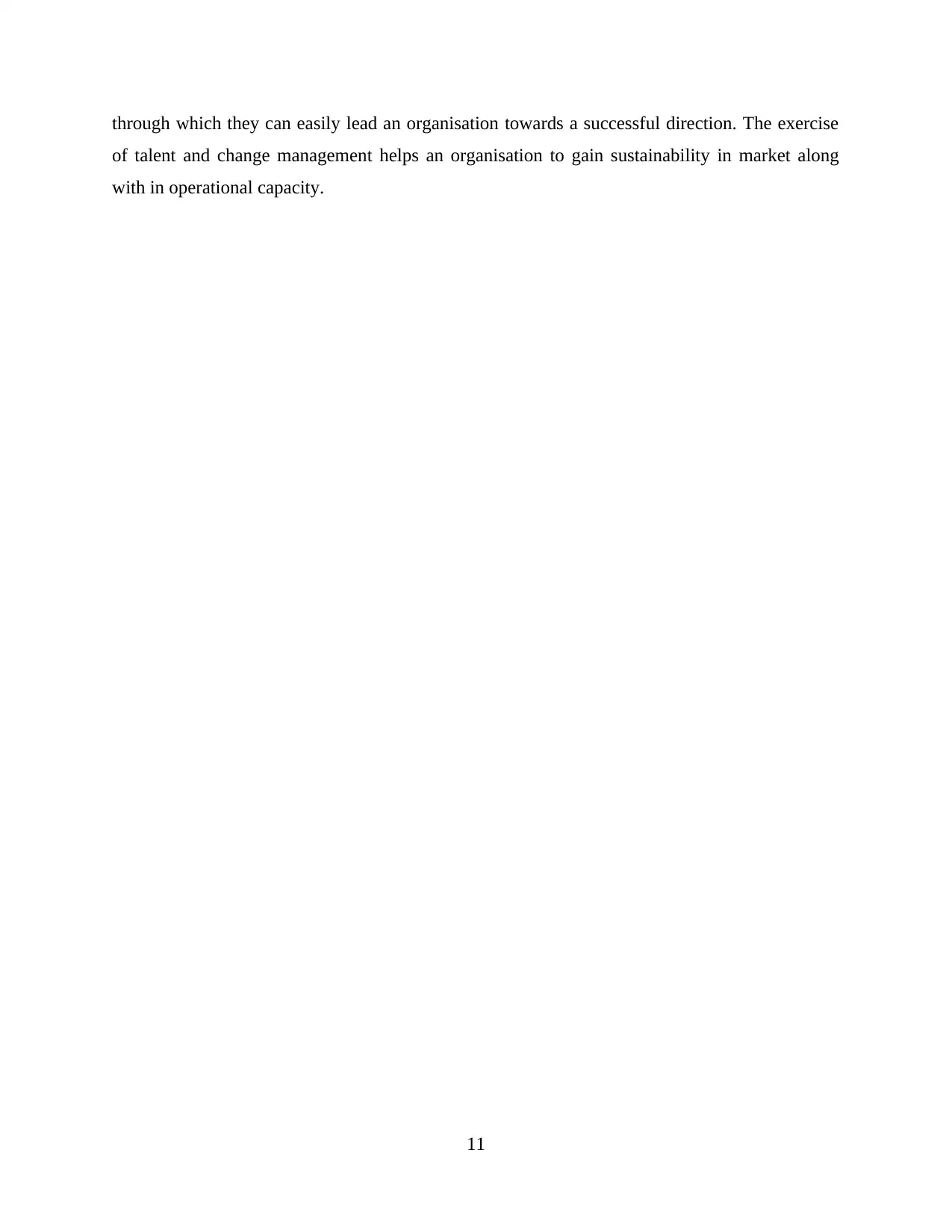
through which they can easily lead an organisation towards a successful direction. The exercise
of talent and change management helps an organisation to gain sustainability in market along
with in operational capacity.
11
of talent and change management helps an organisation to gain sustainability in market along
with in operational capacity.
11
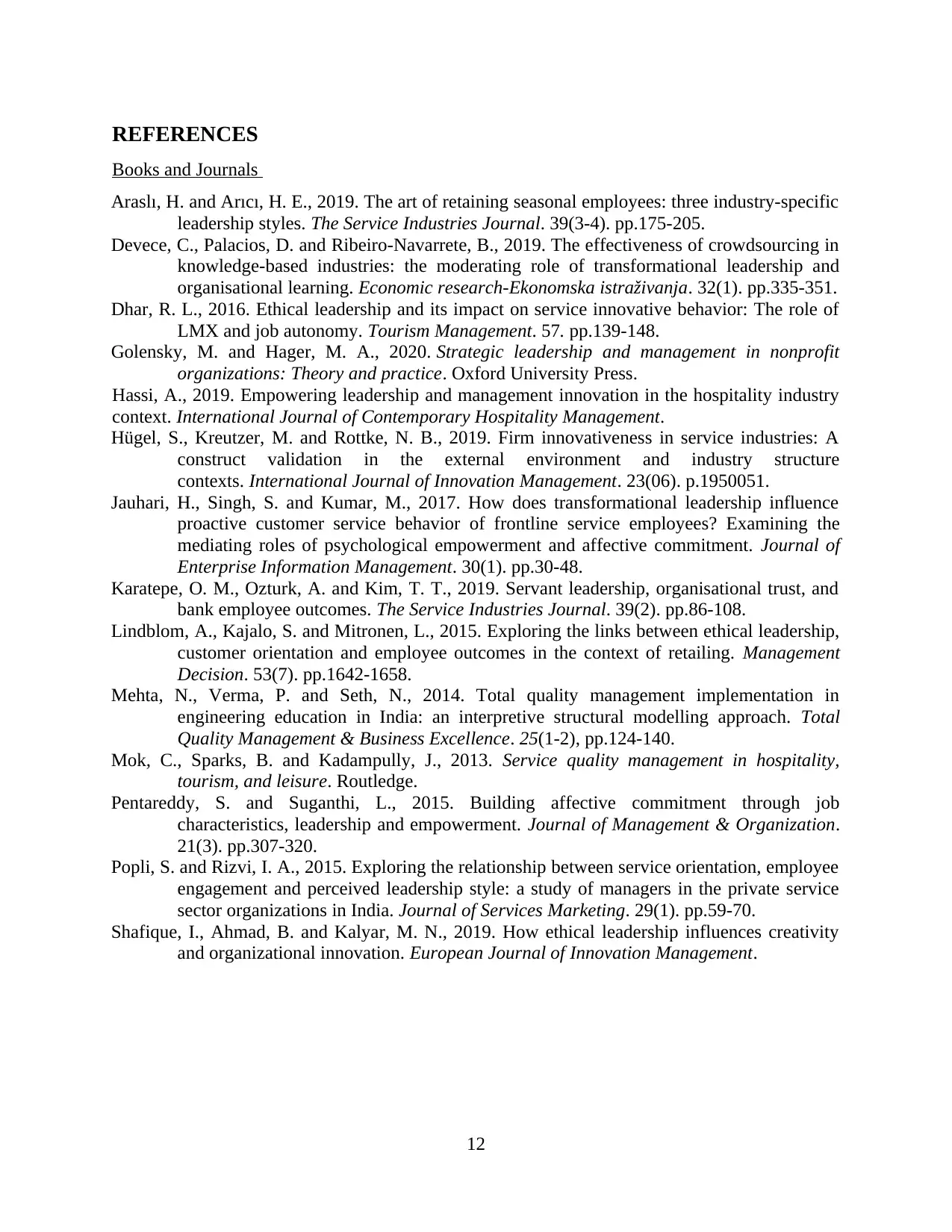
REFERENCES
Books and Journals
Araslı, H. and Arıcı, H. E., 2019. The art of retaining seasonal employees: three industry-specific
leadership styles. The Service Industries Journal. 39(3-4). pp.175-205.
Devece, C., Palacios, D. and Ribeiro-Navarrete, B., 2019. The effectiveness of crowdsourcing in
knowledge-based industries: the moderating role of transformational leadership and
organisational learning. Economic research-Ekonomska istraživanja. 32(1). pp.335-351.
Dhar, R. L., 2016. Ethical leadership and its impact on service innovative behavior: The role of
LMX and job autonomy. Tourism Management. 57. pp.139-148.
Golensky, M. and Hager, M. A., 2020. Strategic leadership and management in nonprofit
organizations: Theory and practice. Oxford University Press.
Hassi, A., 2019. Empowering leadership and management innovation in the hospitality industry
context. International Journal of Contemporary Hospitality Management.
Hügel, S., Kreutzer, M. and Rottke, N. B., 2019. Firm innovativeness in service industries: A
construct validation in the external environment and industry structure
contexts. International Journal of Innovation Management. 23(06). p.1950051.
Jauhari, H., Singh, S. and Kumar, M., 2017. How does transformational leadership influence
proactive customer service behavior of frontline service employees? Examining the
mediating roles of psychological empowerment and affective commitment. Journal of
Enterprise Information Management. 30(1). pp.30-48.
Karatepe, O. M., Ozturk, A. and Kim, T. T., 2019. Servant leadership, organisational trust, and
bank employee outcomes. The Service Industries Journal. 39(2). pp.86-108.
Lindblom, A., Kajalo, S. and Mitronen, L., 2015. Exploring the links between ethical leadership,
customer orientation and employee outcomes in the context of retailing. Management
Decision. 53(7). pp.1642-1658.
Mehta, N., Verma, P. and Seth, N., 2014. Total quality management implementation in
engineering education in India: an interpretive structural modelling approach. Total
Quality Management & Business Excellence. 25(1-2), pp.124-140.
Mok, C., Sparks, B. and Kadampully, J., 2013. Service quality management in hospitality,
tourism, and leisure. Routledge.
Pentareddy, S. and Suganthi, L., 2015. Building affective commitment through job
characteristics, leadership and empowerment. Journal of Management & Organization.
21(3). pp.307-320.
Popli, S. and Rizvi, I. A., 2015. Exploring the relationship between service orientation, employee
engagement and perceived leadership style: a study of managers in the private service
sector organizations in India. Journal of Services Marketing. 29(1). pp.59-70.
Shafique, I., Ahmad, B. and Kalyar, M. N., 2019. How ethical leadership influences creativity
and organizational innovation. European Journal of Innovation Management.
12
Books and Journals
Araslı, H. and Arıcı, H. E., 2019. The art of retaining seasonal employees: three industry-specific
leadership styles. The Service Industries Journal. 39(3-4). pp.175-205.
Devece, C., Palacios, D. and Ribeiro-Navarrete, B., 2019. The effectiveness of crowdsourcing in
knowledge-based industries: the moderating role of transformational leadership and
organisational learning. Economic research-Ekonomska istraživanja. 32(1). pp.335-351.
Dhar, R. L., 2016. Ethical leadership and its impact on service innovative behavior: The role of
LMX and job autonomy. Tourism Management. 57. pp.139-148.
Golensky, M. and Hager, M. A., 2020. Strategic leadership and management in nonprofit
organizations: Theory and practice. Oxford University Press.
Hassi, A., 2019. Empowering leadership and management innovation in the hospitality industry
context. International Journal of Contemporary Hospitality Management.
Hügel, S., Kreutzer, M. and Rottke, N. B., 2019. Firm innovativeness in service industries: A
construct validation in the external environment and industry structure
contexts. International Journal of Innovation Management. 23(06). p.1950051.
Jauhari, H., Singh, S. and Kumar, M., 2017. How does transformational leadership influence
proactive customer service behavior of frontline service employees? Examining the
mediating roles of psychological empowerment and affective commitment. Journal of
Enterprise Information Management. 30(1). pp.30-48.
Karatepe, O. M., Ozturk, A. and Kim, T. T., 2019. Servant leadership, organisational trust, and
bank employee outcomes. The Service Industries Journal. 39(2). pp.86-108.
Lindblom, A., Kajalo, S. and Mitronen, L., 2015. Exploring the links between ethical leadership,
customer orientation and employee outcomes in the context of retailing. Management
Decision. 53(7). pp.1642-1658.
Mehta, N., Verma, P. and Seth, N., 2014. Total quality management implementation in
engineering education in India: an interpretive structural modelling approach. Total
Quality Management & Business Excellence. 25(1-2), pp.124-140.
Mok, C., Sparks, B. and Kadampully, J., 2013. Service quality management in hospitality,
tourism, and leisure. Routledge.
Pentareddy, S. and Suganthi, L., 2015. Building affective commitment through job
characteristics, leadership and empowerment. Journal of Management & Organization.
21(3). pp.307-320.
Popli, S. and Rizvi, I. A., 2015. Exploring the relationship between service orientation, employee
engagement and perceived leadership style: a study of managers in the private service
sector organizations in India. Journal of Services Marketing. 29(1). pp.59-70.
Shafique, I., Ahmad, B. and Kalyar, M. N., 2019. How ethical leadership influences creativity
and organizational innovation. European Journal of Innovation Management.
12
⊘ This is a preview!⊘
Do you want full access?
Subscribe today to unlock all pages.

Trusted by 1+ million students worldwide
1 out of 12
Related Documents
Your All-in-One AI-Powered Toolkit for Academic Success.
+13062052269
info@desklib.com
Available 24*7 on WhatsApp / Email
![[object Object]](/_next/static/media/star-bottom.7253800d.svg)
Unlock your academic potential
Copyright © 2020–2026 A2Z Services. All Rights Reserved. Developed and managed by ZUCOL.




